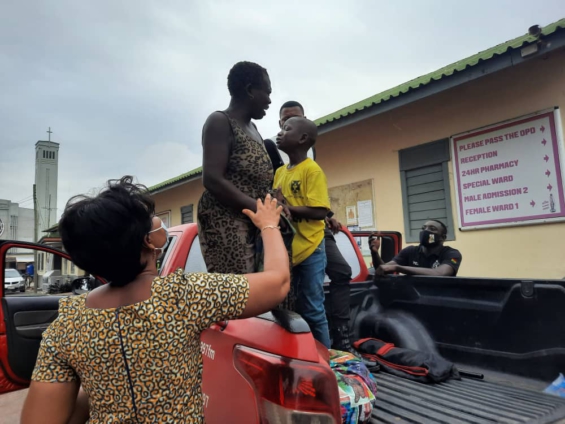The Department of Social Welfare under the Gender, Children and Social Protection Ministry have initiated a family tracing process to identify possible relations of the ten-year-old homeless boy who used to sleep at the underbridge of the Kwame Nkrumah Interchange.
After a Joy News story that highlighted his plight, little Ebenezer was rescued with his mentally challenged mum on Friday [August 13] in a mission that lasted up to 10 hours.
“My father is dead, so I want to go to my village at Sampa [North]”, he said when rescuers met him around Avenor.
“I want you to take my mum to [the] hospital”, Ebenezer told Joy News journalists and Social Welfare officers.
He will only come with them if they took his mother along.
When asked if he’d like to be put in a home where he’d be given food, clothing, and other needs, he answered that “yes, but my mommy [must] know about it”.
But with his mum currently undergoing treatment for her condition and the boy in alternative care, the social welfare department says it has begun tracing possible family relations of the boy.
Head of Foster Care Services Unit at the Department of Social welfare, Samuel Anaglate, told Joy News, “we are working with our social welfare unit in the Bono Region to trace possible family members of this boy”.
He continued to say, “we will, however, need support for the boy. Because sometimes you’ll find a family member who is willing to take the boy but does not have the resources to take good care of him.”
Like Eben, hundreds of kids are roaming the streets of Accra in search of warmth and support from a society that is constantly failing them.
In 2017, the Gender Ministry launched a campaign to end streetism in Ghana.
The programme dubbed “#Operation Get off the Streets for a Better Life” aimed to identify persons on the streets, profiling and integrating them with their parents, caregivers, families, and community in five years.
It was also to ensure that target groups are completely cleared from the streets.
The target groups included Kayayei, hawkers, children who are beggars, adult beggars, and those contracted to push physically challenged persons.
The rest are persons with disabilities, mental health problems, families on the streets, displaced persons (international migrants), and ‘begging contractors’.
But four years after it was launched, the menace of streetism seems to have worsened, with various civil society groups calling for renewed efforts towards the agenda.
Latest Stories
-
Which will you vote for in 2024 Election: Honesty, Character, or Campaign Promises?
3 hours -
The ball is in Iran’s court after US pressure pays off
4 hours -
‘Japa’ sweeps Nigeria’s hospitals
4 hours -
Obuasi: Catholic Voices GH choral peace concert unites NPP, NDC
4 hours -
Lordina Supports NDC campaign in Ketu North with donation of medical equipment to Afife Health Centre
4 hours -
MTN Foundation delivers crucial technology tools to Eastern Regional Hospital
4 hours -
Galien Forum Africa: Enhaning African women’s role in climate and environmental crises
10 hours -
7th Galien Africa Forum ends with emphasis on health, innovation, and climate action in Africa
10 hours -
Ruthless Barcelona thrash Real Madrid to go 6 points clear
10 hours -
National Farmers’ Day scheduled for November 8
11 hours -
Samson’s Take: Why over 75% vote but only 5% join protests
12 hours -
Krachi East Chiefs applaud Bawumia for campaigning on issues with evidence
13 hours -
National Security Ministry dismisses Reuters’ claims that militants are using Ghana as logistical base
13 hours -
BOST and its CEO win big at 8th Ghana Energy Awards
15 hours -
Accused person in protest over alleged $3m BOST scandal discharged
15 hours

